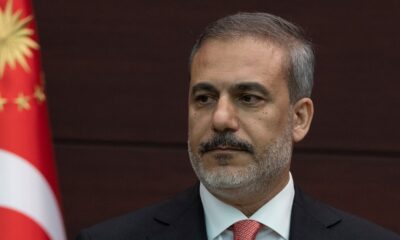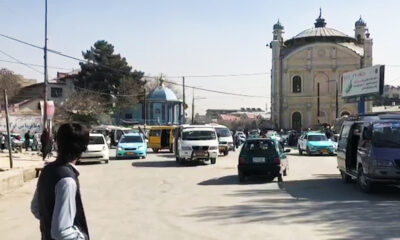COVID-19
COVID-19; Ghazanfar’s body laid to rest in Balkh
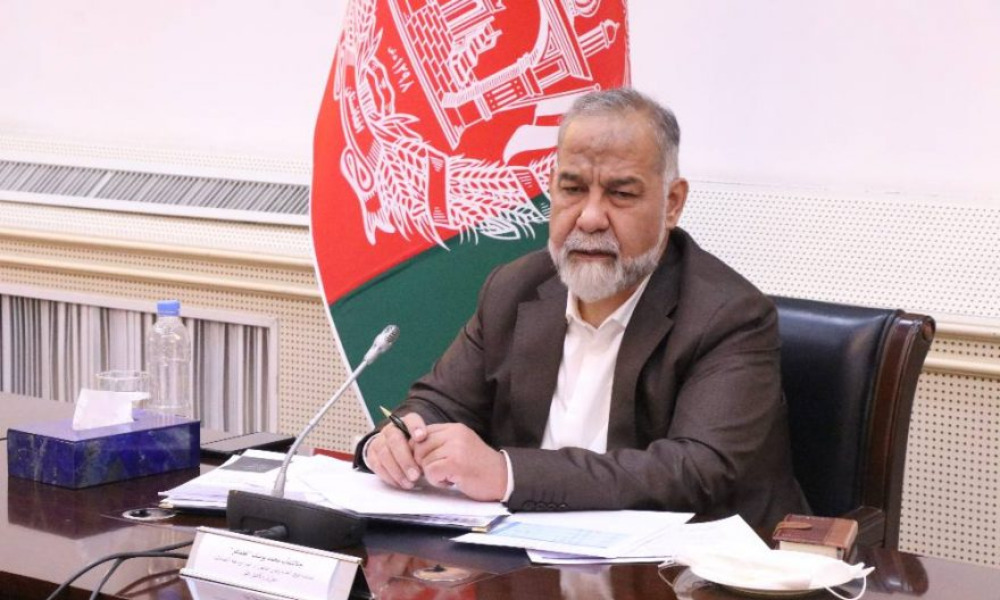
Mohammad Yousuf Ghazanfar, the President’s Special Envoy for development, economic, commercial, and alleviation of poverty affairs has died of Coronavirus.
The Presidential Palace issued a statement called the death of Ghazanfar as a great loss for the country; saying he had “served the country.”
Yousuf Ghazanfar’s body was laid to rest in Mazar-e-Sharif in a special ceremony attended by a number of government officials.
The presidential palace says that Mohammad Yusuf Ghazanfar’s was a “pious, benevolent and nationalist figure” who was always striving for progress and development in Afghanistan.
Meanwhile, the Chamber of Commerce considers Yousuf Ghazanfar’s functions to be very valuable for economic development in the country.
Yousuf Ghazanfar was under treatment in Turkey after contracting the coronavirus.
The funeral ceremony for Ghazanfar was held at the Presidential Palace as well while his corpse was being buried in Balkh on Saturday evening.
(1/5) مراسم نماز جنازۀ غایبانه مرحوم محمد یوسف غضنفر نمایندۀ فوق العاده رئیس جمهور در امور اقتصادی و تجارتی و کاهش فقر که روز گذشته در اثر بیماری کرونا وفات نموده بود، به اشتراک محمد اشرف غنی رئیس جمهوری اسلامی افغانستان در ارگ برگزار گردید. pic.twitter.com/pKE1EEEKYA
— ارگ (@ARG_AFG) July 4, 2020
The ceremony was attended by President Ashraf Ghani, the First Vice President Amrullah Saleh, a number of cabinet ministers, high-ranking government officials, and a number of prominent figures of the country.
The President and other participants paid tribute and prayed for the soul of the late Yousuf Ghazanfar and wished the deceased a happy paradise.
Ghazanfar died of coronavirus at a hospital in Ankara, Turkey on Friday evening.
COVID-19
WHO declares end to COVID global health emergency

The World Health Organization said Friday that COVID-19 no longer qualifies as a global emergency, marking a symbolic end to the devastating coronavirus pandemic that triggered once-unthinkable lockdowns, upended economies and killed millions of people worldwide.
The announcement, made more than three years after WHO declared the coronavirus an international crisis, offers some relief, if not an ending, to a pandemic that stirred fear and suspicion, hand-wringing and finger-pointing across the globe, AP reported.
The U.N. health agency’s officials said that even though the emergency phase was over, the pandemic hasn’t finished, noting recent spikes in cases in Southeast Asia and the Middle East.
WHO says thousands of people are still dying from the virus every week, and millions of others are suffering from debilitating, long-term effects.
“It’s with great hope that I declare COVID-19 over as a global health emergency,” WHO Director-General Tedros Adhanom Ghebreyesus said.
“That does not mean COVID-19 is over as a global health threat,” he said, warning that new variants could yet emerge. Tedros noted that while the official COVID-19 death toll was 7 million, the real figure was estimated to be at least 20 million.
Tedros said the pandemic had been on a downward trend for more than a year, acknowledging that most countries have already returned to life before COVID-19.
He bemoaned the damage that COVID-19 had done to the global community, saying the pandemic had shattered businesses, exacerbated political divisions, led to the spread of misinformation and plunged millions into poverty.
When the U.N. health agency first declared the coronavirus to be an international crisis on Jan. 30, 2020, it hadn’t yet been named COVID-19 and there were no major outbreaks beyond China.
More than three years later, the virus has caused an estimated 764 million cases globally and about 5 billion people have received at least one dose of vaccine.
In the U.S., the public health emergency declaration made regarding COVID-19 is set to expire on May 11, when wide-ranging measures to support the pandemic response, including vaccine mandates, will end. Many other countries, including Germany, France and Britain, dropped most of their provisions against the pandemic last year.
When Tedros declared COVID-19 to be an emergency in 2020, he said his greatest fear was the virus’ potential to spread in countries with weak health systems.
Most recently, WHO has struggled to investigate the origins of the coronavirus, a challenging scientific endeavor that has also become politically fraught.
COVID-19
COVID-19 in Iran: Nearly 900 new cases, 24 deaths recorded

The Iranian health ministry announced on Sunday that more than 890 new cases of COVID-19 have been identified across the country during the past 24 hours, adding that 24 patients have died in the same period of time, Fars News Agency reported.
“A sum of 891 new patients infected with COVID-19 have been identified in the country based on confirmed diagnosis criteria during the past 24 hours,” the Iranian Health Ministry’s Public Relations Center said on Sunday, adding, “454 patients have been hospitalized during the same time span.”
The ministry’s public relations center said 611 people infected with COVID-19 are in critical condition.
COVID-19
China says 200 million treated, pandemic ‘decisively’ beaten

China says more than 200 million of its citizens have been diagnosed and treated for COVID-19 since it lifted strict containment measures beginning in November.
With 800,000 of the most critically ill patients having recovered, China has “decisively beaten” the pandemic, according to notes from a meeting of the ruling Communist Party’s all-powerful Politburo Standing Committee presided over by President and party leader Xi Jinping, AP reported.
China enforced some of the world’s most draconian lockdowns, quarantines and travel restrictions and still faces questions about the origins of the virus that was first detected in the central Chinese city of Wuhan in late 2019. Heavy-handed enforcement prompted rare anti-government protests and took a heavy toll on the world’s second-largest economy.
The official Xinhua News Agency quoted Xi as saying that policies to control the outbreak had been “entirely correct.” The abrupt lifting in November and December of the “zero COVID” policy that had sought to eliminate all cases of the virus led to a surge in infections that temporarily overwhelmed hospitals.
Case numbers have since peaked and life has largely returned to normal, although international travel in and out of China has yet to return to pre-pandemic levels.
China is now transitioning to a post-pandemic stage after a fight against the outbreak that was “extraordinary in the extreme,” Xinhua said.
The government will continue to “optimize and adjust prevention and control policies and measures according to the times and situations with a strong historical responsibility and strong strategic determination,” Xinhua said.
-

 Latest News5 days ago
Latest News5 days agoRussia estimates up to 23,000 terrorists present in Afghanistan
-

 Latest News4 days ago
Latest News4 days agoIEA rejects Russia’s claims of foreign militants in Afghanistan
-
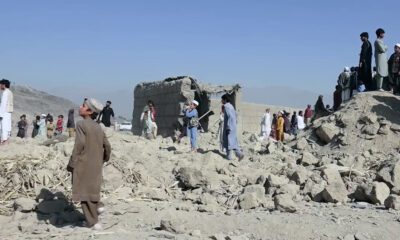
 Latest News4 days ago
Latest News4 days agoUNAMA reports civilian casualties from Pakistani airstrikes in Afghanistan
-

 International Sports4 days ago
International Sports4 days agoAFC Champions League Elite gears up for Round of 16 as league stage concludes
-

 Sport3 days ago
Sport3 days agoRichard Pybus appointed as head coach of Afghanistan’s national cricket team
-
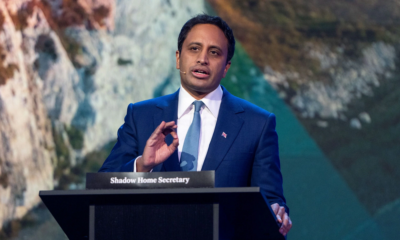
 Latest News5 days ago
Latest News5 days agoUK’s Reform party pledges visa ban affecting Afghanistan and five other states
-

 World5 days ago
World5 days agoMexican military kills cartel boss ‘El Mencho’ in US-backed raid
-

 World2 days ago
World2 days agoIndia’s Modi backs Israel in address at Israeli parliament




